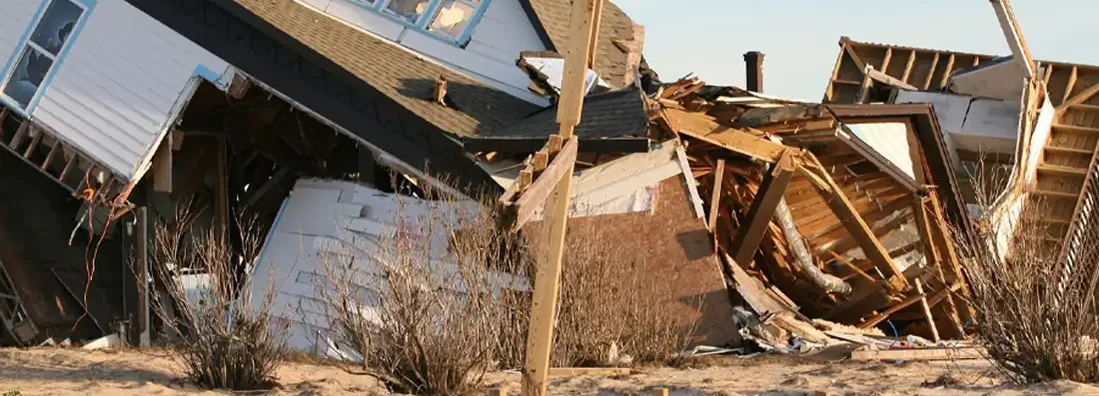Eight Steps to Take if a Hurricane Damages or Destroys Your Home

Jeff Green has held a variety of sales and management roles at life insurance companies, Wall street firms, and distribution organizations over his 40-year career. He was previously Finra 7,24,66 registered and held life insurance licenses in multiple states. He is a graduate of Stony Brook University.

Over the last five years, there's been an average cost of $148.4 billion per year in weather and climate disasters, including hurricanes. In fact, hurricanes cause the most damage out of all weather disasters. Hurricanes might not strike often, but when they do, they leave behind a big mess. If your house is part of that mess, you’ll need to file an insurance claim.
When push comes to shove, do you know what steps to take after a hurricane and if you need to file a claim? It involves more than just calling your insurance company. That's why working with an independent insurance agent can help. You'll want to start working with an agent before a hurricane occurs so they can assure that you're set up with the right coverage. They'll also help you if you need to file a claim.
Eight Steps to Take after a Hurricane Damages Your Home
The number one priority after any catastrophe is the safety of you and your loved ones. Hurricane damage can alter the structure of your home, making for potentially dangerous debris. Once you've ensured your safety and determined that the hurricane has passed, you can take these steps to assess the damage and get the claims process started.
Step 1. Contact Your Insurance Agent
Insurance agents do more than help you find coverage. They're also your advocate and provide a knowledge base should you need to file a claim. If there's been a severe weather event, your agent will likely be aware of it and be waiting for your call.
When you contact your agent, they will let you know the proper steps to take to get the claims process started and help it move along smoothly. You can ask your agent as many questions as you need, including the following:
- What is the next step?
- How long will it take for me to hear from the insurance company?
- What information should I start gathering?
- Can you remind me of the coverage I have?
- What else can I do right now?
Step 2. Contact Your Insurance Company
Your insurance company will also likely be aware of the hurricane, but you still need to contact them in order to file a claim. This will be the first step that your insurance agent will take. When they contact your insurance company, they'll report the damage. If you don't have an insurance agent, you should contact your insurance company yourself.
You'll likely start with your home insurance company as that will cover any damage to the structure of your home, your property, and your personal belongings. However, if there is damage from flooding, you'll need to contact your flood insurance carrier. And if you've got damage to vehicles, you'll work directly with your car insurance company to file a claim.
In most cases, your home will not be the only home impacted by the hurricane. This could delay your response time from the insurance company, but carriers are required to respond to claims within a certain amount of days. The insurance company is likely preparing for the claims to come in and will have a process nailed down for the next steps.
If the damage to your home is significant and you need temporary housing, your insurance company will work with you to find other arrangements.
Step 3. Take Inventory of the Damage
Your insurance company is going to want to know everything that was lost in the hurricane. You may not be able to remember all of your possessions, which is why it's best to take inventory as soon as possible. If you have been keeping an inventory list of your personal belongings prior to the catastrophe, it can be a major help in this scenario.
Assuming it's safe to do so, walk through your home and take photos and videos of all the damage, including the large and small items that were impacted by the hurricane. You also want to write down any damage you see. Don't worry about how significant the damage is, your insurance company can sort that out. It's more important that you're as thorough as possible so that you're properly reimbursed.
The insurance company will send a claims adjuster to come through your home and do their own assessment. It's valuable for the adjuster to have your list of damage to help the claims process go more quickly and assure that no items are forgotten.
It’s likely that your insurance company will ask you to fill out a Proof of Loss. This is a great way to start listing all of your possessions. People often feel like the Proof of Loss is a tell-all for items destroyed in a hurricane, but if you think of items after you’ve turned in your Proof of Loss, you can still claim them with your insurance.
Step 4. Prepare for the Claims Adjuster
Claims adjusters work with insurance carriers to come to a home after a disaster, assess the damage, and report the overall cost back to the insurance company. Based on the adjuster's report, the insurance company determines how much it owes the homeowner for repair and reimbursement.
In most cases, the claims adjuster will contact you to schedule a time to come to your home within a couple of weeks. However, if the hurricane was severe and impacted thousands of homes, this may take longer.
Adjusters will ask you for a variety of information regarding your home, possessions, and their value. It's best to get them this information as quickly as possible. The sooner you can provide them answers, the sooner you can start rebuilding your home.
Step 5. Start to Rebuild or Repair
After assessing the damage you may be able to begin replacing items immediately. You'll also have a better idea of whether you'll need to fully replace the home or just repair parts of your home. To find contractors, your insurance will make suggestions or you can select a contractor yourself.
Any time you work with a professional to make repairs or upgrades to your home, you want to make sure of a few things:
- Are they properly licensed?
- Do they have insurance coverage?
- Are you certain they're an approved contractor with your insurance?
- Have you compared costs with other contractors?
- Are they being upfront about costs, materials, and details for the work you need?
Unfortunately, it's common for fraudulent contractors to contact people who have recently been through a catastrophe. Asking the above questions can help avoid this.
Once you start working with a contractor, you'll want to keep any receipts so you can provide them to your insurance company for reimbursement.
Step 6. Document Everything
Rebuilding a home after hurricane damage will include conversations with adjusters, contractors, your agent, the insurance company, and many others. If possible, it can be valuable to keep the documentation of all your conversations in writing. This way you can look back for key information should you need it.
Beyond receipts from contractor work, you also want to keep receipts from any purchases including hotel stays, rentals, cars, meals, etc. When an insurance company is reimbursing for a claim, they will not pay replacement costs until items are actually purchased. In addition, you'll likely be surprised about the things you'll be reimbursed for through your home and auto insurance coverages.
Step 7. Understand Your Rights
Home insurance is one of those insurance policies that everyone has but they don't think about using. When we suddenly need to use our coverage, it's common not to be fully in the know of your rights and the coverage that you should be receiving. Be sure to work with your insurance agent to understand how your home insurance should work for you after a catastrophe.
Hopefully, you have coverage designed to protect your home after a hurricane, like flood coverage and windstorm coverage. But if you don’t, your agent can work with you so that you understand your options.
Hurricanes usually result in flood and wind damage, and that coverage isn’t included in your homeowners policy. Your insurance agent can help you navigate these policies or handle a claim, should you not have flood insurance.
Step 8. Discuss Any Changes Needed to Coverage for Future Incidents
Going through a catastrophe and filing a claim can reveal some gaps in your coverage and help you be better prepared for future incidents. In the unfortunate event that you have to deal with a hurricane, try and learn as much as you can from the process. Take note of what was easy versus what was complicated, where you thought you'd have protection and you didn't, and what could help next time.
You can then speak with your agent to make adjustments to your existing policy to be better prepared for the future. Insurance is supposed to work for you, and your agent can make sure that's what your coverage is set up to do.
Why Work with an Independent Insurance Agent?
If your home and livelihood are victims of a hurricane, you'll have a lot on your mind in addition to filing a claim. Independent insurance agents have been through the claim process thousands of times and will know where to start, how to make the process go smoothly, and get you the coverage you're entitled to.
Agents have your back throughout the whole process. An agent is in your corner from the moment you set up a free consultation with them. Agents are located across the US, making it easy to work with them to compare costs and coverages for all the insurance policies you need.
https://coast.noaa.gov/states/fast-facts/hurricane-costs.html
